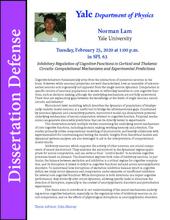Cognitive behaviors fundamentally arise from the interactions of numerous neurons in the brain. However, while neuronal properties are well-characterized, how an ensemble of interconnected neurons acts is generally not apparent from the single-neuron dynamics. Computation in specific circuits of neuronal populations is known to reflect key variables in core cognitive functions, such as decision making, although the underlying mechanisms are not fully understood. There thus are explanatory gaps between the knowledge at the levels of single neurons, neural circuits, and behavior.
Microcircuit-level modelling, which describes the dynamics of populations of biophysically-realistic model neurons, is a useful tool to bridge the aforementioned gaps. Constrained by neuronal dynamic and connectivity pattern, microcircuit model can demonstrate potential underlying mechanisms of neural computation relevant to cognitive function. Proposed mechanisms can generate dissociable predictions that can be directly tested in experiments.
This dissertation entails multiple studies concerning the underlying neural mechanisms of core cognitive functions, including decision making, working memory, and attention. The studies primarily utilize computational modelling of microcircuits, and heavily collaborate with experimentalists for constraining and testing the models. Insights from theoretical models and dynamical systems analyses are also leveraged to aid in the interpretation of computational model results.
Inhibitory neurons, which suppress the activity of other neurons, are crucial components of neural microcircuit. They maintain the microcircuit in the dynamical regime appropriate for neural computation, and can serve as focal “control knobs” to modulate cognitive processes based on demand. The dissertation explores both roles of inhibitory neurons. In particular, the balance between excitation and inhibition is a critical regime for cognitive computation, and its disruption is linked to deficit in cognitive functions induced across neuropsychiatric disorders. To understand how disruptions of excitation-inhibition balance result in cognitive deficit, we study circuit dynamics and computation under excessive or insufficient inhibition for several core cognitive functions. While disruptions in both directions can impair cognitive performance, they distinctly alter circuit dynamics, allowing specific tasks to dissociate the direction of disruption, especially in the context of neuropsychiatric disorders and perturbation experiments.
This thesis aims to contribute to our understanding of the neural mechanisms underlying various cognitive behaviors, especially on the regulatory roles of inhibitory neurons on circuit computation, and on the effects of physiological disruptions in neuropsychiatric disorders.
Thesis Advisor: John Murray
Dissertation Defense: Norman Lam, Yale University, “Inhibitory Regulation of Cognitive Functions in Cortical and Thalamic Circuits: Computational Mechanisms and Experimental Predictions”
Event time:
Tuesday, February 25, 2020 - 1:00pm to 2:00pm
Location:
Sloane Physics Laboratory (SLP), Room 63
217 Prospect Street
New Haven, CT
06511
Event description:
Contact:
(see "Description" above)
